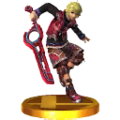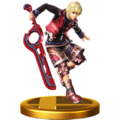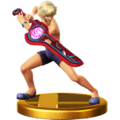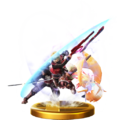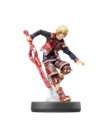Shulk (SSB4)
| Shulk in Super Smash Bros. 4 | |
|---|---|
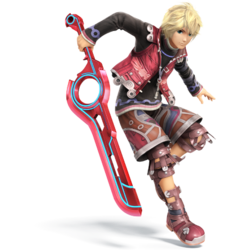 
| |
| Universe | Xenoblade Chronicles |
| Availability | Starter |
| Final Smash | Chain Attack |
| Tier | G (40) |
| “ | Shulk Foresees a Fight! | ” |
| —Introduction Tagline | ||
Shulk (シュルク, Shulk) is a starter newcomer in Super Smash Bros. 4. He was leaked alongside Bowser Jr. and Ganondorf via videos from footage used by ESRB before being officially confirmed on August 29th, 2014. His reveal coincided with the announcement of Xenoblade Chronicles 3D, the New Nintendo 3DS port of his Wii debut title Xenoblade Chronicles, which was originally released for the Wii. Additionally, he was the final character revealed prior to the release of Super Smash Bros. for Nintendo 3DS. Adam Howden and Shintarō Asanuma reprise their roles as Shulk's voice actors in the English and Japanese versions of SSB4, respectively.
Shulk is currently ranked 40th on the tier list, placing him at the top of the G-tier. He possesses the longest overall disjointed reach of any fighter in the entire series, giving him one of the most effective movesets for spacing relative to the rest of the cast, most evident in his wide-ranged neutral and forward aerials, along with high-ranged smash attacks that have consistent KO potential. He also has wide versatility with his Monado Arts, allowing him to adapt his stats to fit the situation while opening up opportunities that he would not have without them, such as potent edgeguarding abilities with Jump, one of the best approach speeds with Speed, very high survivability with Shield, damaging throw combos with Buster, and some of the strongest finishing moves in the game with Smash. However, he is held back due to his very steep learning curve, with each Art giving him new weaknesses and some giving him different mobility speeds to consider, along with his most advanced technique Monado Art Landing Lag Canceling being highly difficult to perform consistently. His biggest issue, however, is his very sluggish frame data compared to his reach, while being notable as the only character in the series that cannot autocancel any of his aerial moves, making him prone to punishment and out of shield retaliation. These issues make Shulk difficult and/or unwieldy to use consistently in high-level play compared to other fighters, and gives him low representation in tournaments due to the amount of skill required to consistently benefit from his technical abilities. Despite this, a few dedicated mains such as Jerm constantly work to find set-ups and technical combos that are unique to him due to his Monado Arts, giving him some degree of tournament success.
Attributes
Shulk's characteristics are balanced overall. His walking speed, dashing speed, falling speed, air speed and gravity are all average compared to the rest of the cast. However, he possesses above-average weight and one of the lowest air accelerations in the game, thus making his archetype a borderline heavyweight.
One of Shulk's greatest strengths is his outstanding range, courtesy of his signature weapon, the Monado. Its beam properties gives him the longest disjointed weapon in the series, even surpassing Marth's in Melee. Thanks to his high reach, Shulk has a very effective spacing ability, as very few other fighters in the game have melee attacks that outmatch his disjointed range. While his neutral attack and tilt attacks are good for combos and spacing (such as his up tilt that can cover multiple get-up options from the ledge) and his smash attacks all being potent KOing options that can easily reach distant opponents (his side smash being the third highest-reaching side smash in the game, behind Corrin and the Mii Gunner), his aerial moveset benefits him the most, due to the large hitboxes of his neutral and forward aerial. This makes him potent at aerial combat, as his neutral aerial can be used for anything from starting combos to covering landing options, forward aerial being powerful at edgeguarding and spacing, and his back aerial being a long reaching and especially powerful finisher. Stages with platforms such as Battlefield and Dream Land allow him to further take advantage of the large hitboxes of his attacks to effectively space opponents out of a specific side of the stage, making him very difficult to approach on such stages.
Despite his aforementioned average stats, the most unique advantage Shulk has at his disposal are his five Monado Arts, which allow him to tweak his attributes considerably and grant him options for virtually any situation. Jump increases his air speed and jump height, greatly improving his off-stage game and recovery, grants his already effective aerial attacks even more utility, and makes him difficult to catch even for aerial fighters like Jigglypuff. Speed increases his walking, dashing and air speeds while lowering his jump height, granting him tremendous horizontal mobility and efficient short hops, improving his approach and ground-to-aerial combo ability. Shield drastically improves his knockback defense, and allows him to survive attacks far longer than any other character. Buster lowers the knockback of all his moves and increases their damage outputs, allowing his tilts and throws to efficiently combo, letting him rack up ludicrous amounts of damage in a very short period of time. Finally, Smash turns many of his moves into potent KOing options, with his smash attacks and both his down and back throws becoming some of the deadliest of their kind. With access to these stat-changing abilities, Shulk has a very effective "adapt-for-the-upper-hand" style of fighting, and usually has an easier time mixing up his game compared to other characters should the Arts be used effectively, especially if used in hand with his powerful aerial game.
His other special moves have their own forms of utility as well. Back Slash is very powerful if striking the opponent's back and has long range regardless, making it a great surprise attack as well as a spacing tool. Air Slash grants a good amount of vertical distance (which is further increased if Jump is active), comes out quickly, and has decent knockback, making it a good recovery and an even better out of shield option. Finally, Vision is the longest-lasting counterattack in the game and has the longest range as well, giving him one of the most effective counters of any character. Its secondary attack also hits harder than any other counterattack in the game.
However, Shulk is not without his weaknesses. To compensate for his overall high melee range, his moveset is notably sluggish; with frame data rivalling King Dedede's and Ganondorf's, he does not have a single attack that hits before frame 9 (barring neutral attack and Vision), and none of them have less than 25 frames of ending lag (barring down tilt), making his moves highly punishable if spaced incorrectly or used carelessly, especially against shields at close range. In addition, he is the only character who cannot autocancel any of his aerials at all, forcing him to take landing lag every time he starts an aerial attack. To further compound this, all his aerials (barring neutral aerial) also have considerable landing lag, and without use of the Monado Art Landing Lag Canceling, his landings are less safe than those other fighters. Essentially, this makes it important for Shulk to space his attacks carefully as he can easily be punished for missing, while his sluggish moveset also makes it difficult for him to deal with juggling, as most of his moves do not start up fast enough.
His special attacks are also flawed in some ways. Back Slash's knockback is exceptionally weak if hitting the opponent's front, has considerable ending lag, and does not edge sweetspot. Air Slash provides very little horizontal momentum, and thus makes his recovery predictable, even with Jump. Vision's counter window decays upon consecutive use, discouraging the move's frequent use. But his most noticeable flaws are the Monado Arts' drawbacks: if an Art is active, it causes some of his other stats to drop, weakening some of his abilities. Jump makes him very vulnerable to damage, while Speed lowers his damage output and reduces his jump force to the point of hindering his vertical mobility. Shield drastically reduces his mobility and noticeably reduces his damage output, making it hard to get a percentage lead, as well as making his recovery one of the worst in the game. Shield's increased knockback defense can also be a double-edged sword as it leaves Shulk heavily susceptible to combos and juggling that can be difficult to escape from due to Shield decreasing his mobility. Buster increases his vulnerability to damage (although not to the same extent as Jump) and the lower knockback makes it nearly impossible to KO opponents without smash attacks, even well over 150%. Finally, Smash severely reduces his survivability, hinders his combo game, and his attacks become the least damaging in the game. Hence, while each Art grants him wide benefits, players have to take note of their weaknesses as well, as a careful opponent can potentially take advantage of them to put him at a disadvantageous position.
With customs on, Shulk has various options. Decisive Monado Arts last longer and have amplified effects, but cannot be changed, making it a high-risk, high-reward move. Hyper Monado Arts last much less, but have even more powerful effects, allowing him to briefly boost a needed stat to the extreme and capitalize upon its benefits in a much shorter time. Back Slash Leap offers quicker start-up and more vertical range, at the cost of some horizontal range and more ending lag. Advancing Air Slash gives more horizontal distance and the second hit is stronger, but it gives less vertical distance. Mighty Air Slash is more powerful, but has only half the range, making it difficult to connect the second hit. Dash Vision is weaker than normal, but it has much more range, giving Shulk his only anti-projectile option, and another recovery move. Lastly, Power Vision has much more startup upon countering an attack and a much stricter counter window if used repeatedly, but a successful full-power counterattack can be devastating and is capable of generating one-hit KOs, especially with the Smash Art.
Overall, Shulk can be difficult to master, with one of the highest learning curves in the game. While his ability to adapt and space is virtually unrivaled, it takes time to learn his wildcard-like playstyle, and requires extensive knowledge of his match-ups, very quick adaptability, and frame-perfect technical skill to prevent opponents from capitalizing on his slow attacks. These factors give him low representation in the competitive scene, despite his potential.
Update history
Shulk is notorious for having been heavily buffed in the vast majority of game updates, being among the most drastically buffed characters in the game with negligible nerfs. Update 1.0.4 increased the damage outputs on all of his attacks, while the changes to shield mechanics in updates 1.1.0 and 1.1.1 make his attacks harder to punish on shield and have also turned several of his attacks into surprisingly effective shield breakers when used in conjunction with the Buster Art. In addition, all of Shulk's tilt attacks and aerial attacks received slight increases to their damage outputs in update 1.1.3, along with all of his aerials having decreases to their landing lag. Other than these buffs, his attacks have only been given minor tweaks and hitbox adjustments during updates. Overall, Shulk is considered to be much more viable than what he was during the initial release of SSB4.
 Neutral attack deals more damage: 3% → 3.5% (hit 1, hit 2), 4.3%/3.2% → 5.3%/4.2% (clean hit 3, late hit 3).
Neutral attack deals more damage: 3% → 3.5% (hit 1, hit 2), 4.3%/3.2% → 5.3%/4.2% (clean hit 3, late hit 3). All tilt attacks deal 1% more damage: 12%/10.5% → 13%/11.5% (forward), 7%/6% → 8%/7% (up), 8%/6% → 9%/7% (down).
All tilt attacks deal 1% more damage: 12%/10.5% → 13%/11.5% (forward), 7%/6% → 8%/7% (up), 8%/6% → 9%/7% (down). Forward tilt's knockback scaling decreased: 100 → 92.
Forward tilt's knockback scaling decreased: 100 → 92. Down tilt's second hitbox's position has changed: bone 25, offset [0.0,2.0,-1.0] → bone 0, offset [0.0,5.5,5.5]. This removes a point-blank blind spot.
Down tilt's second hitbox's position has changed: bone 25, offset [0.0,2.0,-1.0] → bone 0, offset [0.0,5.5,5.5]. This removes a point-blank blind spot. Dash attack deals 1% more damage: 10% → 11%.
Dash attack deals 1% more damage: 10% → 11%. Forward and up smash attacks deal 0.5% more damage: 5%, 12.5%/11% → 5.5%, 13%/11.5% (forward), 4%, 13% → 4.5%, 13.5% (up).
Forward and up smash attacks deal 0.5% more damage: 5%, 12.5%/11% → 5.5%, 13%/11.5% (forward), 4%, 13% → 4.5%, 13.5% (up). Forward smash received a variety of changes to enable both of its hits to connect better.
Forward smash received a variety of changes to enable both of its hits to connect better. Forward smash's first hit's angles altered: 40° (upward), 75° (forward), 84° (downward) → 78° (upward), 10° (forward), 40° (downward).
Forward smash's first hit's angles altered: 40° (upward), 75° (forward), 84° (downward) → 78° (upward), 10° (forward), 40° (downward). Forward smash's first hit's fixed knockback values decreased: 45/45/31 → 28/28/28.
Forward smash's first hit's fixed knockback values decreased: 45/45/31 → 28/28/28. Forward smash's first hit's radii decreased: 4.0/4.0/4.0 → 2.0/2.0/4.0.
Forward smash's first hit's radii decreased: 4.0/4.0/4.0 → 2.0/2.0/4.0. Forward smash's first hit's positions elevated: [-2.0,0.0,1.0]/[4.1,0.0,1.0]/[10.0,0.0,1.0] → [11.0–4.0,0.0,2.0]/[11.0–4.0,0.0,-0.5]/[-2.0,0.0,1.0].
Forward smash's first hit's positions elevated: [-2.0,0.0,1.0]/[4.1,0.0,1.0]/[10.0,0.0,1.0] → [11.0–4.0,0.0,2.0]/[11.0–4.0,0.0,-0.5]/[-2.0,0.0,1.0]. Forward smash's second hit's radii increased: 3.5/2.0 → 4.0/3.0.
Forward smash's second hit's radii increased: 3.5/2.0 → 4.0/3.0. Forward smash's second hit's first hitbox x-offset decreased: 22.0–0.0 → 21.0–0.0.
Forward smash's second hit's first hitbox x-offset decreased: 22.0–0.0 → 21.0–0.0. Down smash deals 1% more damage (13%/10%, 11%/9%, 9%/7%, 7%/5%, 5%/3% → 14%/11%, 12%/10%, 10%/8%, 8%/6%, 6%/4%.)
Down smash deals 1% more damage (13%/10%, 11%/9%, 9%/7%, 7%/5%, 5%/3% → 14%/11%, 12%/10%, 10%/8%, 8%/6%, 6%/4%.) All aerial attacks deal 1% more damage: 6%/7% → 7%/8% (neutral), 6.5%/5% → 7.5%/6% (forward), 11%, 7% → 12%, 8% (back), 4%, 9%/6.5% → 5%, 10%/7.5% (up), 5%/3%, 9%/8% → 6%/4%, 10%/9% (down).
All aerial attacks deal 1% more damage: 6%/7% → 7%/8% (neutral), 6.5%/5% → 7.5%/6% (forward), 11%, 7% → 12%, 8% (back), 4%, 9%/6.5% → 5%, 10%/7.5% (up), 5%/3%, 9%/8% → 6%/4%, 10%/9% (down). Forward aerial's landing lag decreased.
Forward aerial's landing lag decreased. All throws' first hits deal 1% more damage: 2% → 3%.
All throws' first hits deal 1% more damage: 2% → 3%. Monado Speed's damage output multiplier increased: 0.72x → 0.8x.
Monado Speed's damage output multiplier increased: 0.72x → 0.8x. Monado Buster's damage input multiplier decreased: 1.2x → 1.13x.
Monado Buster's damage input multiplier decreased: 1.2x → 1.13x. All variations of Air Slash deal 1% more damage on the first hit: 5%/4% → 6%/5% (Air Slash, Advancing Air Slash), 8%/6% → 9%/7% (Mighty Air Slash).
All variations of Air Slash deal 1% more damage on the first hit: 5%/4% → 6%/5% (Air Slash, Advancing Air Slash), 8%/6% → 9%/7% (Mighty Air Slash). All variations of Vision have had their y-offsets increased: 8.0 → 9.0.
All variations of Vision have had their y-offsets increased: 8.0 → 9.0.
 Back Slash's start-up decreased: 31 frames → 22.
Back Slash's start-up decreased: 31 frames → 22. Aerial Back Slash travels slower, making predictions harder.
Aerial Back Slash travels slower, making predictions harder. Up aerial's first hit now launches opponents at 96° and its second hit's hitbox sizes increased: 3.5/5.5 → 3.8/6.5. This improves its horizontal coverage.
Up aerial's first hit now launches opponents at 96° and its second hit's hitbox sizes increased: 3.5/5.5 → 3.8/6.5. This improves its horizontal coverage.
 Dash Vision's knockback growth increased: 84 → 89 (standard), 94 → 99 (alternate).
Dash Vision's knockback growth increased: 84 → 89 (standard), 94 → 99 (alternate). Dash Vision's angle altered: 35° → 32°.
Dash Vision's angle altered: 35° → 32°.
 Dash attack deals 0.5% more damage: 11% → 11.5%.
Dash attack deals 0.5% more damage: 11% → 11.5%. All tilt attacks deal 0.5% more damage: 13%/11.5% → 13.5%/12% (forward), 8%/7% → 8.5%/7.5% (up, down).
All tilt attacks deal 0.5% more damage: 13%/11.5% → 13.5%/12% (forward), 8%/7% → 8.5%/7.5% (up, down). All aerial attacks deal more damage: 7%/8% → 7.5%/8.5% (neutral), 7.5%/6% → 8%/6.5% (forward), 12%/8% → 12.5%/8.5% (back), 5%/ 10%/7.5% → 5.5%/10.5%/8% (up), 5%/7%/10%/9% → 6%/7.5%/11.5%/10.5% (down).
All aerial attacks deal more damage: 7%/8% → 7.5%/8.5% (neutral), 7.5%/6% → 8%/6.5% (forward), 12%/8% → 12.5%/8.5% (back), 5%/ 10%/7.5% → 5.5%/10.5%/8% (up), 5%/7%/10%/9% → 6%/7.5%/11.5%/10.5% (down). All aerials landing lag decreased: 12 frames → 10 (neutral), 18 frames → 16 (forward), 21 frames → 19 (back), 17 frames → 15 (up), 25 frames → 23 (down).
All aerials landing lag decreased: 12 frames → 10 (neutral), 18 frames → 16 (forward), 21 frames → 19 (back), 17 frames → 15 (up), 25 frames → 23 (down).
Moveset
The Monado does more damage and knockback on some attacks if it hits from the center of the blade rather than from the tip. In addition, damage outputs and knockback properties can be further manipulated by the Monado Arts. The following moveset list details the properties of Shulk's attacks when he has no active Monado Arts.
| Name | Damage | Description | ||
|---|---|---|---|---|
| Neutral attack | 3.5% | A punch followed by a mid-level roundhouse kick followed by an upward lifting slash. By far Shulk's fastest move, hitting on frame 5, and has good range similar to Ike's neutral attack. It is also Shulk's only move that does not activate the Monado's beam blade. The roundhouse kick looks similar to Dive Sobat, one of Reyn's physical Arts. | ||
| 3.5% | ||||
| 5.3% (clean), 4.2% (late) | ||||
| Forward tilt | 13.5% (blade), 12% (beam) | Shulk swings the Monado in front of him inward as he draws it from his shoulder. Has noticeable ending lag, but it is capable of KOing at high percents, especially when boosted by Smash. Is notable for being able to hit opponents close to his back, which can be used as a surprise option. Resembles one of his basic auto attacks from Xenoblade Chronicles. | ||
| Up tilt | 8.5% (blade), 7.5% (beam) | Shulk leaps in place and does a fast, upward-arcing swipe above himself. A very good anti-air move with enormous vertical range, but lacks a hitbox on both sides of Shulk, leaving him open on the ground. A reliable damage racker with the Buster Art, especially after an up throw, and a good surprise KOing option when boosted by Smash. | ||
| Down tilt | 8.5% (blade), 7.5% (beam) | Shulk does a forward leaning, sweeping slash at the opponent's feet. Has the least ending lag out of all his moves, and has good range. A good combo starter with Speed or Buster, as it send opponents into the air and in front of Shulk. | ||
| Dash attack | 11.5% | Swipes the Monado inward after drawing it from his shoulder into a sliding brake. Similar to his forward tilt and down tilt in terms of motion. One of Shulk's most potent KOing options when boosted by Smash. It has very high ending lag, however, and can be punishable if used excessively. | ||
| Forward smash | 5.5% (hit 1), 13% (hit 2 blade), 11.5% (hit 2 beam) | A two-handed thrust with the Monado's beam blade revealing itself, causing a slight recoil. The move has two hits, the first from the Monado itself and the second from the beam blade. Angling up increases the move's knockback scaling, while angling down allows the move to hit characters hanging from a ledge. The third longest reaching non-projectile forward smash in the game, behind Corrin and the Mii Gunner. An extremely damaging move when boosted by Buster and a very strong KOing option when boosted by Smash. However, it suffers from high ending lag, which makes it extremely punishable if missed or without Buster's higher shieldstun. The attack itself resembles Slit Edge, one of Shulk's physical Arts in Xenoblade Chronicles. | ||
| Up smash | 4.5% (hit 1), 13.5% (hit 2) | Shulk positions the hilt of the Monado to the ground, causing the beam to strike and reveal itself upward. Like his forward smash, there are two hits to this move, with the first hit dragging foes into the beam blade. Its deceptive horizontal range allows it to punish rolls and landings, and its high vertical range and knockback makes it a great anti-air move in general. Slightly lower but still noticeable ending lag compared to his side smash. | ||
| Down smash | 14% (hit 1 blade), 11% (hit 1 beam), 12% (hit 2 blade), 10% (hit 2 beam), 10% (hit 3 blade), 8% (hit 3 beam), 8% (hit 4 blade), 6% (hit 4 beam), 6% (hit 5 blade), 4% (hit 5 beam) | A high-range, spinning slash with Shulk dragging the Monado around him along the ground. The move hits five times (three at Shulk's front and two at his back), with the first hit having high power for a down smash, and each hit having more range but less power than the previous one. Extremely useful for punishing rolls and spot dodges, and can break full shields if Buster is active and a shielding opponent is cornered at a ledge. However, it suffers from the most ending lag of all his smash attacks. It looks similar to War Swing, one of Reyn's physical Arts in Xenoblade Chronicles. | ||
| Neutral aerial | 7.5% (blade), 8.5% (beam) | A circular, upward-arcing slash spanning from his upper leg to his head, with the shortest landing lag duration of any of his aerials. The hitbox begins at Shulk's toes and continues all the way over his head. It is a very useful approach option and a great combo starter if either Jump, Speed or Buster is active due to its long range, low landing lag and long-lasting hitbox. However, this long-lasting hitbox, combined with the move's high ending lag, makes it a very unsafe move to use off-stage when fast falling, as Shulk will be in serious danger of self-destructing. | ||
| Forward aerial | 8% (blade), 6.5% (beam) | An overhead, forward-leaning descending slash that reaches and ends a bit behind him. It has the least ending lag out of all his aerials, and extreme range for an aerial. Great for spacing and interrupting approaches, a powerful combo move with either Speed or Buster, and a potent edge-guarding move with Jump, which can let Shulk wall of pain opponents to the blast line. | ||
| Back aerial | 12.5% (clean), 8.5% (late) | Shulk thrusts the Monado behind him after a pause, with the Monado's beam blade revealing itself. The hitbox of the attack begins at Shulk's body. Has slow startup and high landing lag, but also long horizontal range and high knockback. Shulk's most reliable off-stage KOing and edge-guarding option, especially when boosted by the Smash Art. | ||
| Up aerial | 5.5% (hit 1), 10.5% (hit 2 blade), 8% (hit 2 beam) | Shulk thrusts the Monado upward as its beam blade reveals itself. Acts like his forward and up smash, with a weak first hit that leads into a second stronger hit. A useful juggling tool against falling opponents and a very strong KOing option when boosted by Smash, considering its deceptively high vertical range. However, it lacks horizontal range, which can make it difficult to land. | ||
| Down aerial | 7.5% (hit 1 grounded), 6% (hit 1 aerial), 11.5% (hit 2 blade), 10.5% (hit 2 beam) | Shulk holds the Monado below him and performs a downward thrust, with the beam blade revealing itself downward. The first hit of the move deals set knockback, and can easily connect to the second hit, which meteor smashes if sweetspotted, done by hitting with just the tip of the first hit. It is a decent edgeguarding move. This move can also stage spike ledge-hanging opponents, giving Shulk an option to surprise foes. It has high landing lag, making it punishable if missed as well as having low horizontal range like his up aerial. | ||
| Grab | — | |||
| Pummel | 3% | Strikes the opponent's head with the Monado's hilt. A slow pummel, but when Buster is active, it is tied with Olimar's White Pikmin-based pummel for having the highest damage output in the game. Conversely, this pummel has the lowest damage output per second in the game if Shield or Smash is active. | ||
| Forward throw | 3% (hit 1), 8% (throw) | Shulk pulls the opponent towards him before slashing them with a two-handed upward slash from the Monado. With Speed or Buster, this can lead into a dash attack or a forward aerial. Although the slash can hit other opponents close by, it deals set knockback on anyone that is not the intended target of the throw. | ||
| Back throw | 3% (hit 1), 9% (throw) | Shulk pulls the opponent behind him and stabs their midsection with the Monado's beam blade while holding the Monado in a reverse grip. With Smash active, this is one of the strongest back throws in the game. One of the few moves that does back-facing knockback, which can be followed up with Back Slash if Buster is active. | ||
| Up throw | 3% (hit 1), 4% (throw) | Heaves the opponent in the air and kneels down similar to his up smash, revealing the Monado's beam blade to stab his juggled opponent's chest. A reliable combo throw at low percents or with Buster active, as it can lead into several up tilts with Buster active or a ground attack if the opponent air dodges. However, its low hitstun can prevent these follow-ups. | ||
| Down throw | 3% (hit 1), 4% (throw) | Slams the opponent onto the ground and backstabs them with the Monado. With Buster active, this may lead into dash attack, forward smash or forward aerial at 0%. With Smash active, this is the strongest down throw in the game, and consequently Shulk's most powerful throw. | ||
| Forward roll Back roll Spot dodge Air dodge |
— | — | ||
| Techs | — | — | ||
| Floor attack (front) Floor getups (front) |
7% | |||
| Floor attack (back) Floor getups (back) |
7% | |||
| Floor attack (trip) Floor getups (trip) |
5% | |||
| Edge attack Edge getups |
7% | |||
| Neutral special | Default | Monado Arts | 0% | Shulk activates one of five Monado-based Arts: Jump, Speed, Shield, Buster, or Smash. Each Art enhances a particular attribute at the cost of hindering others. |
| Custom 1 | Decisive Monado Arts | 0% | The Arts last for 21 seconds instead of 16, but once an Art is activated, it cannot be changed. There is also a slight delay before the Arts activate. | |
| Custom 2 | Hyper Monado Arts | 0% | The Arts' positives and negatives are both amplified, but the Arts only last for 5 seconds instead of 16. Additionally, their recharge times are 5 seconds longer. | |
| Side special | Default | Back Slash | 10%/9% (front), 16%/14% (back) | Shulk leaps forward and performs a wide-ranged downward slash with the Monado's beam blade, similarly to Link's dash attack. The attack is more powerful if it hits the opponent's back. |
| Custom 1 | Back Slash Leap | 10%/8% (front), 16%/14% (back) | Leaps upward before performing a downward slash. Has reduced horizontal movement, but comes out a little faster. | |
| Custom 2 | Back Slash Charge | 4% (front), 13%/11% (back) | Grants super armor for the downward slash. This move has increased horizontal movement, but does noticeably less damage if it does not strike the opponent's back. | |
| Up special | Default | Air Slash | 6% (hit 1 clean), 5% (hit 1 late), 5.5% (hit 2) | Shulk jumps and performs an upwards slash with the Monado's beam blade, similarly to Dolphin Slash. The first slash deals set knockback, but pressing the attack button at the end of the slash will result in a second, forward slash which deals moderate knockback and gives Shulk a small vertical boost. |
| Custom 1 | Advancing Air Slash | 6% (hit 1 clean), 5% (hit 1 late), 8% (hit 2) | The first slash launches enemies diagonally while the second slash moves Shulk forward. | |
| Custom 2 | Mighty Air Slash | 9% (hit 1 clean), 7% (hit 1 late), 10% (hit 2) | The range of the attack is reduced, but it deals more damage. | |
| Down special | Default | Vision | 1.3x (min 13%/10% or 10%/7%) | Shulk slightly squats and leans forward while holding the Monado up to the side of his face in order to foresee an attack. Upon taking a hit, Shulk retaliates with a powerful, high-range slash that launches opponents forward. The move can be altered if used on the ground, with the alternative hit being faster and stronger while launching opponents backward, at the cost of less range. The standard attack Shulk performs when Vision activates looks similar to Stream Edge, one his physical Arts, while the alternate attack looks similar to Thunder, one of Dunban's Ether Arts. |
| Custom 1 | Dash Vision | 1.0x (min 11%/8% or 8%/5%) | Shulk takes a big step forward, increasing the counterattack's range. The counterattack is also faster, but it lacks power. | |
| Custom 2 | Power Vision | 1.5x (min 20%/17% or 17%/14%) | Shulk counterattacks with greater power. However, the attack is slower and if used too much, the counterattack will become less and less effective. | |
| Final Smash | Chain Attack | 3% (hit 1), 2% (hits 2-12), 12% (hit 13), 5% (hit 14) | Shulk summons Dunban and Riki to perform a Chain Attack on his opponents before he finishes the assault with a powerful slash. | |
On-screen appearance
- Jumps down onto the stage while performing a slash using the activated Monado, before placing it on his back after it deactivates. Buster's symbol flashes for a quick moment while his back briefly faces the camera.
| File:Battle Entrance (Shulk).jpg |
|---|
Taunts
- Up taunt: Shrugs, shakes his head, and waves a hand as if lecturing someone while saying "Now it's Shulk time!" (穏やかじゃないですね, Not being gentle, huh? or That doesn't sound good.). The English phrase is a reference to Reyn, his best friend and one his party members in Xenoblade Chronicles, who occasionally utters the phrase "Now it's Reyn time!" whenever his Talent Art gauge is completely filled during combat. The Japanese phrase similarly references a popular meme in Japan; in this case, a line Shulk commonly says when accepting quests in Xenoblade Chronicles.
- Side taunt: Grips the Monado's handle with his right hand while triumphantly pumping his left fist and announcing "I'm really feeling it!" (だんだん乗ってきたよ!, I'm getting the hang of it!). References one of Shulk's voice lines in Xenoblade Chronicles when his tension level increases in combat.
- Down taunt: Grips the Monado with both hands, activates it and poses similarly to when he activates Buster while saying "This is the Monado's power!" (モナドの力よ!, The Monado's power!/The power of the Monado!). If timed correctly, it can dodge certain projectiles, such as Fox and Falco's Blaster, Link's Hero's Bow, and Pit's Palutena's Arrow. References one of Shulk's lines when he activates the Monado's Talent Art in Xenoblade Chronicles.
| Up taunt | Side taunt | Down taunt |
|---|---|---|
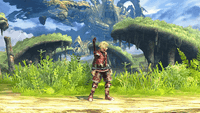
|
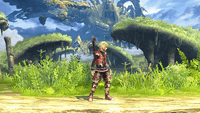
|
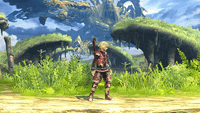
|
Idle poses
- Taps his foot while making a thinking gesture. Based on his idle animation from Xenoblade Chronicles.
- Tenses and quickly looks behind himself, then in front of him before easing up.
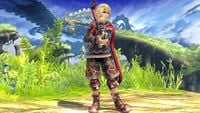 |
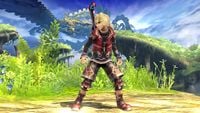
|
|---|
Crowd cheer
| English | Japanese | |
|---|---|---|
| Cheer | ||
| Description | Shulk! Shulk! Shulk! | Shuruku! |
| Pitch | Group chant | Female |
Victory poses
- Swings the Monado a few times while it is active, then holds it level to his head as it deactivates, saying either "The future is ours to decide." or "I've got a good rhythm going!".
- Swings the inactive Monado upwards, places it on his back, and poses with a hand on his hip, saying either "I got through that pretty good!" or "This is a good result!". The former is a quote Shulk can exclaim after finishing a battle in Xenoblade Chronicles, although it has also been changed from plural in that game to singular in SSB4, even in Team Battles, where it is his only line.
- Bows down with the Monado held lengthwise, activates it and then either
 quickly flexes his fingers before re-grabbing the Monado's handle or
quickly flexes his fingers before re-grabbing the Monado's handle or  continues to hold its handle before posing with the Monado backhandedly, saying either "I can feel the power!" or "I can change the future.".
continues to hold its handle before posing with the Monado backhandedly, saying either "I can feel the power!" or "I can change the future.".
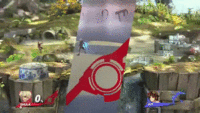 |
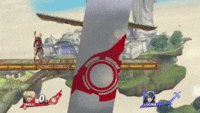 |
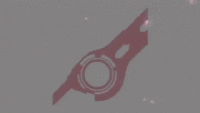
|
|---|
In competitive play
Official Custom Moveset Project
| Character | Custom sets available | ||||
|---|---|---|---|---|---|
| 1113 | 2113 | 3113 | 1123 | 3123 | |
| 3213 | 1122 | 3122 | 1213 | 2123 | |
Notable players
Trophies
- Shulk
In Xenoblade Chronicles, this young lad's colony is attacked by the Mechon, so he and his friends set off to take them down. In Smash Bros., his Monado Arts let him change his specialization during battle. You can choose to boost a stat—his jump or attack, for example—but other stats might drop as a result, so choose wisely.
In Xenoblade Chronicles, this young lad's colony is attacked by the Mechon, so he and his friends set off to take them down. In this game, his Monado Arts let him change his specialisation during battle. You can choose to boost a stat—his jump or attack, for example—but other stats might drop as a result, so choose wisely.
- Shulk (Alt.)
Shulk's up special Air Slash is an upward slash done during a jump. Press the button again quickly to launch opponents sideways. His side special Back Slash, on the other hand, is a downward swing with a very wide range, though using it leaves Shulk wide open. Try hitting foes from behind with this!
Shulk's up special, Air Slash, is an upward slash done during a jump. Press the button again quickly to launch opponents sideways. His side special, Back Slash, on the other hand, is a downward swing with a very wide range, although using it leaves Shulk wide open. Try hitting foes from behind with this to do more damage!
- Chain Attack
- In Xenoblade Chronicles, building up the party's team spirit would let them unleash a chain attack, using multiple Arts in a row to deal massive damage. In this game, Shulk's Final Smash calls party members Dunban and Riki to help obliterate an unlucky target... or multiple targets if you catch more than one in the circle of light!
- ShulkAllStarTrophy3DS.png
Alt. (3DS)
In Event Matches
Solo Events
- Mechanical Menace: Shulk must defeat a metal R.O.B. and Mega Man, as well as Metal Face.
- New Challengers 2: Shulk is one of the seven opponents fought in this event alongside Greninja, Palutena, Robin, Dark Pit, Mega Man, and Pac-Man.
- The Ultimate Swordsman: Shulk is one of the opponents that Ike must defeat.
Co-op Events
- The Ultimate Battle: Two players select a character and must defeat the entire roster.
Alternate costumes

| |||||||

|

|

|

|

|

|

|

|
Gallery
Shulk's amiibo.
- Shulk Alt.png
Swimsuit costume for Shulk.
Fighting Sheik.
Using an up smash against Captain Falcon with the Smash Monado Art activated.
Attacking Donkey Kong and Link.
Posing with two Villagers.
Forward air on Link.
With Luigi on Boxing Ring.
Shulk in Super Smash Bros. for Nintendo 3DS
Reveal trailer
<youtube>GUl1EkUJ46k</youtube>
Trivia
- Several of Shulk's standard attacks share similar animations with either his own or other party members' Arts in his original game.
- Shulk's jump animation is exactly the same as the one used in Xenoblade Chronicles.
- His running animation is also very reminiscent of the one in his home game as well, as well as his idle stance (except that he leans with his left side in SSB4).
- Many of Shulk's voice clips are re-recorded versions of the lines that he would state throughout the game.
- Shulk is the only character to tumble towards the screen when footstooled, whereas other characters would spin towards direction they were facing. He is also the only character to hit the screen with his back during a Screen KO. These animations make the Monado and its active Monado Art more visible to the player.
- Shulk and Cloud in his standard outfit, unlike other fighters with weapons, do not have any visible sheath or holder for their weapons; their swords simply hang from their backs with no buckle or belt to attach to their backs with. They do not have a clearly visible strap for their swords in their debut games either.
- Shulk is the only sword-wielding character in the Super Smash Bros. series that does not hold his weapon in his hands when not attacking with it; this trait excludes Ganondorf and his Sword of Sages, which is only used in a custom move.
- Shulk is also the only realistically designed weapon-wielding character that uses a "wobbling" sound while charging up smash attacks instead of the "unsheathing" sound that other realistic weapon-holding characters typically use.
- Shulk is uniquely the only fighter in the series who cannot autocancel any of his aerials at all, as their autocancel windows are programmed several frames after his aerials fully complete. However, he is the only fighter (apart from Palutena and her up aerial) who can interrupt all aerials during their ending frames, which allows him to act out of them before he lands, such as replacing a back aerial's 19 frames of landing lag by performing a neutral aerial before landing, cutting landing lag to 10 frames.
- Shulk, Wii Fit Trainer, and Bayonetta are the only playable characters in the Super Smash Bros. series with British voice actors.
- One of Shulk's victory voice clips, "I can change the future", is missing from the Sound Test in both versions of the game.
- Despite not being a third-party character, Shulk is placed alongside them in most official material, including the Super Smash Bros. for Nintendo 3DS roster and foldout. In the Super Smash Bros. for Wii U roster, Shulk is placed before the clones, and in the Super Smash Bros. for Wii U manual, he is placed before Bowser Jr. As a result of this placement, Shulk may be mistaken as a third-party character. However, since Nintendo acquired Monolith Soft in 2007 prior to the development of Xenoblade Chronicles, Shulk is not a third-party character.
| Fighters in Super Smash Bros. 4 | |
|---|---|
| Veterans | Bowser · Captain Falcon · Charizard · Diddy Kong · Donkey Kong · Dr. Mario · Falco · Fox · Ganondorf · Ike · Jigglypuff · King Dedede · Kirby · Link · Lucario · Lucas · Luigi · Mario · Marth · Meta Knight · Mewtwo · Mr. Game & Watch · Ness · Olimar · Peach · Pikachu · Pit · R.O.B. · Roy · Samus · Sheik · Sonic · Toon Link · Wario · Yoshi · Zelda · Zero Suit Samus |
| Newcomers | Bayonetta · Bowser Jr. · Cloud · Corrin · Dark Pit · Duck Hunt · Greninja · Little Mac · Lucina · Mega Man · Mii Fighter (Mii Brawler · Mii Gunner · Mii Swordfighter) · Pac-Man · Palutena · Robin · Rosalina & Luma · Ryu · Shulk · Villager · Wii Fit Trainer |
|
| |
|---|---|
| Fighters | Shulk (SSB4 · SSBU) · Pyra (SSBU) · Mythra (SSBU) |
| Assist Trophy | Riki |
| Stages | Gaur Plain · Cloud Sea of Alrest |
| Other characters | Azurda · Dunban · Fiora · Metal Face · Nia · Rex |
| Trophies and Spirits | Trophies · Spirits |
| Music | SSB4 · Ultimate |

